African states are one-by-one falling outside the shackles of neocolonialism. They are saying “non” to France’s longtime domination of African financial, political, economic and security affairs.
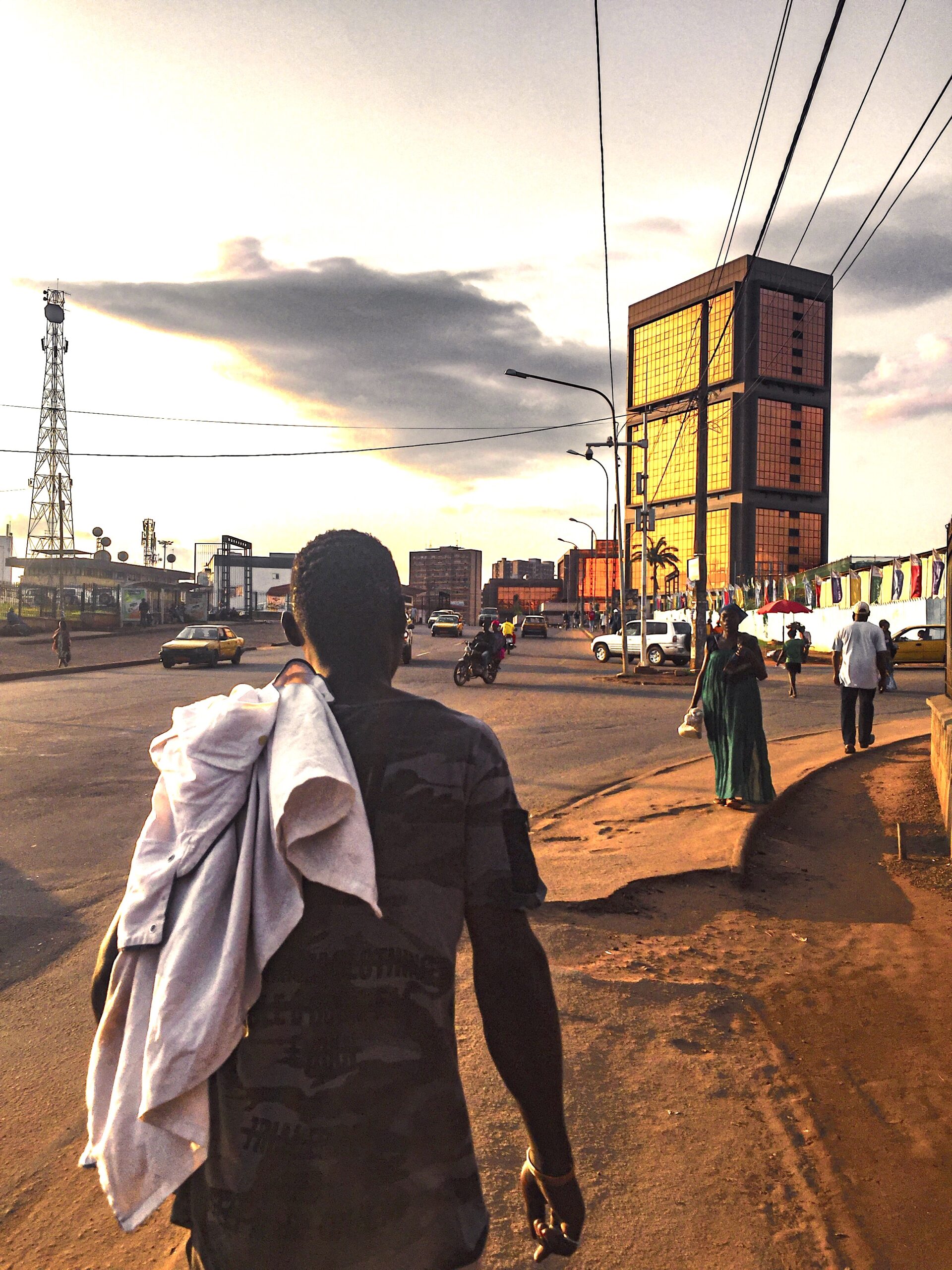
Day Over, July 2019, Yanounde, Cameroon. (Rikyelle Momo Nguematio, Wikimedia Commons, CC BY-SA 4.0)
 By adding two new African member-states to its roster, last months’ summit in Johannesburg heralding the expanded BRICS 11 showed once again that Eurasian integration is inextricably linked to the integration of Afro-Eurasia.
By adding two new African member-states to its roster, last months’ summit in Johannesburg heralding the expanded BRICS 11 showed once again that Eurasian integration is inextricably linked to the integration of Afro-Eurasia.
Belarus is now proposing to hold a joint summit between BRICS 11, the Shanghai Cooperation Organization (SCO) and the Eurasia Economic Union (EAEU). President Aleksandr Lukashenko’s vision for the convergence of these multilateral organizations may, in due time, lead to the Mother of All Multipolarity Summits.
But Afro-Eurasia is a much more complicated proposition. Africa still lags far behind its Eurasian cousins on the road toward breaking the shackles of neocolonialism.
The continent today faces horrendous odds in its fight against the deeply entrenched financial and political institutions of colonization, especially when it comes to smashing French monetary hegemony in the form of the Franc CFA — or the Communauté Financière Africaine (African Financial Community).
Still, one domino is falling after another — Chad, Guinea, Mali, Burkina Faso, Niger and now Gabon. This process has already turned Burkina Faso’s President Captain Ibrahim Traoré, into a new hero of the multipolar world — as a dazed and confused collective West can’t even begin to comprehend the blowback represented by its eight coups in West and Central Africa in less than three years.
Bye Bye Bongo
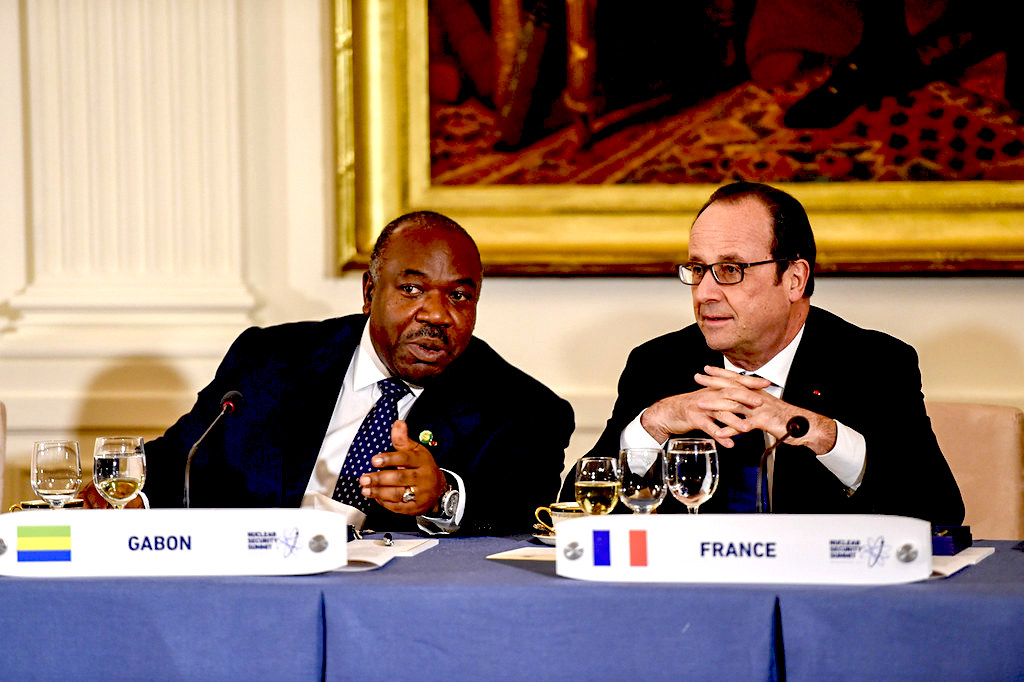
President of Gabon Ali Bongo Ondimba chats with President of France François Hollande at the Nuclear Security Summit dinner held at the White House in Washington, D.C., March 31, 2016. (GPA Photo Archive, Public domain)
Military officers decided to take power in Gabon after hyper pro-France President Ali Bongo won a dodgy election that “lacked credibility.” Institutions were dissolved. Borders with Cameroon, Equatorial Guinea and the Republic of Congo were closed. All security deals with France were annulled. No one knows what will happen with the French military base.
All that was as popular as it comes: soldiers took to the streets of the capital Libreville in joyful singing, cheered on by onlookers.
Bongo and his father, who preceded him, have ruled Gabon since 1967. He was educated at a French private school and graduated from the Sorbonne. Gabon is a small nation of 2.4 million with a small army of 5,000 personnel that could fit into Donald Trump’s penthouse. Over 30 percent of the population lives on less than $1 a day, and in over 60 percent of regions have zero access to healthcare and drinking water.
The military qualified Bongo’s 14-year rule as leading to a “deterioration in social cohesion” that was plunging the country “into chaos.”
[Related:‘Obama’s Man in Africa’ Under House Arrest in Gabon]
On cue, French mining company Eramet suspended its operations after the coup. That’s a near monopoly. Gabon is all about lavish mineral wealth – in gold, diamonds, manganese, uranium, niobium, iron ore, not to mention oil, natural gas, and hydropower. In OPEC-member Gabon, virtually the whole economy revolves around mining.
The case of Niger is even more complex. France exploits uranium and high-purity petrol as well as other types of mineral wealth. And the Americans are on site, operating three bases in Niger with up to 4,000 military personnel. The key strategic node in their “Empire of Bases” is the drone facility in Agadez, known as Niger Air Base 201, the second-largest in Africa after Djibouti.
Niger has raised the price of uranium ore from $0.8 to $200/kg. The spot price for uranium has been around $125/kg.
Niger produced 2,020MT in 2022 or 5% of the world’s uranium supply. Half of Niger’s uranium exports go to France and the EU.
In 2010, France extracted a total… pic.twitter.com/M3eCwTglmb
— Francis Gaitho (@FGaitho237) September 5, 2023
French and American interests clash, though, when it comes to the saga over the Trans-Sahara gas pipeline. After Washington broke the umbilical steel cord between Russia and Europe by bombing the Nord Streams, the EU, and especially Germany, badly needed an alternative.
Algerian gas supply can barely cover southern Europe. American gas is horribly expensive. The ideal solution for Europeans would be Nigerian gas crossing the Sahara and then the deep Mediterranean.
Nigeria, with 5,7 trillion cubic meters, has even more gas than Algeria and possibly Venezuela. By comparison, Norway has 2 trillion cubic meters. But Nigeria’s problem is how to pump its gas to distant customers — so Niger becomes an essential transit country.
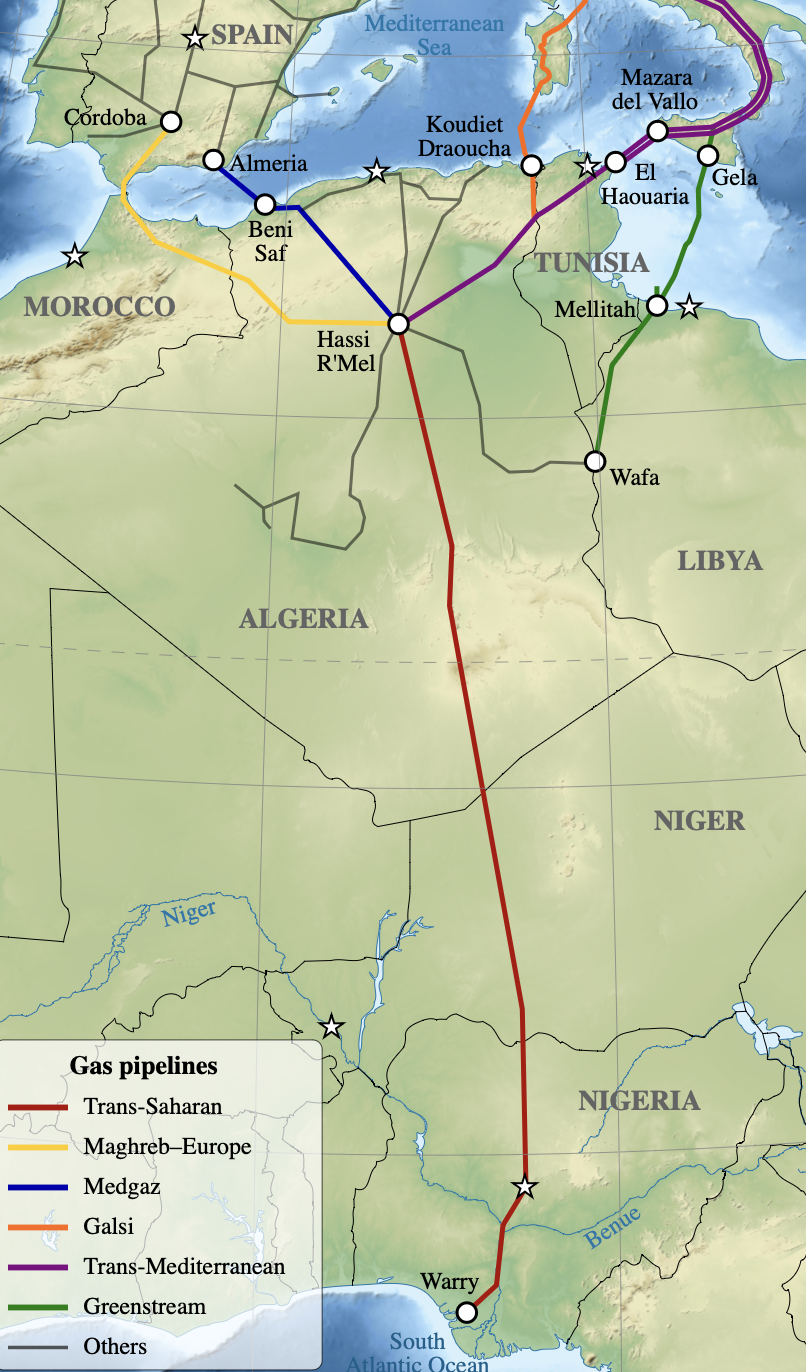
Trans-Saharan gas pipeline in red. (Sémhur, Wikimedia Commons, CC BY-SA 4.0)
When it comes to Niger’s role, energy is actually a much bigger game than the oft-touted uranium — which in fact is not that strategic either for France or the EU because Niger is only the fifth largest world supplier, way behind Kazakhstan and Canada.
Still, the ultimate French nightmare is losing the juicy uranium deals plus a Mali remix: Russia, post-Prighozin, arriving in Niger in full force with a simultaneous expulsion of the French military.
Adding Gabon only makes things dicier. Rising Russian influence could lead to boosting supply lines to rebels in Cameroon and Nigeria, and privileged access to the Central African Republic, where Russian presence is already strong.
It’s no wonder that Francophile Paul Biya, in power for 41 years in Cameroon, has opted for a purge of his Armed Forces after the coup in Gabon. Cameroon may be the next domino to fall.
ECOWAS Meets AFRICOM
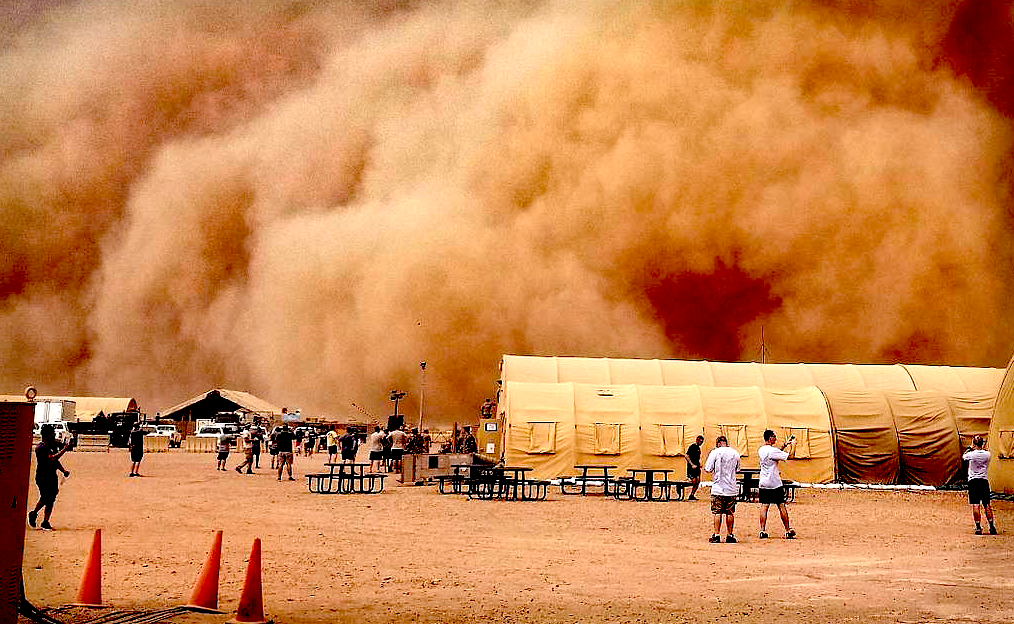
U.S. service members taking photos of a sand storm at Nigerien Air Base 201 in Agadez, June 2018. (U.S. Air Force, Anthony Montero)
The Americans, as it stands, are playing Sphynx. There’s no evidence so far that Niger’s military wants the Agadez base shut down. The Pentagon has invested a fortune in their bases to spy on a great deal of the Sahel and, most of all, Libya.
About the only thing Paris and Washington agree on is that, under the cover of ECOWAS (the Economic Community of West African States), the hardest possible sanctions should be slapped on one of the world’s poorest nations (where only 21 percent of the population has access to electricity) — and they should be much worse than those imposed on the Ivory Coast in 2010.
Then there’s the threat of war. Imagine the absurdity of ECOWAS invading a country that is already fighting two wars on terror on two separate fronts: Against Boko Haram in the southeast and against ISIS in the Tri-Border region.
ECOWAS, one of eight African political and economic unions, is a proverbial mess. It packs 15 member nations — Francophone, Anglophone and one Lusophone — in Central and West Africa, and it is rife with internal division.
Donate to CN’s Fall Fund Drive
The French and the Americans first wanted ECOWAS to invade Niger as their “peacekeeping” puppet. But that didn’t work because of popular pressure against it. So, they switched to some form of diplomacy. Still, troops remain on stand-by, and a mysterious “D-Day” has been set for the invasion.
The role of the African Union (AU) is even murkier. Initially, they stood against the coup and suspended Niger’s membership. Then they turned around and condemned the possible Western-backed invasion. Neighbors have closed their borders with Niger.
ECOWAS will implode without U.S., French and NATO backing. Already it’s essentially a toothless chihuahua — especially after Russia and China have demonstrated via the BRICS summit their soft power across Africa.
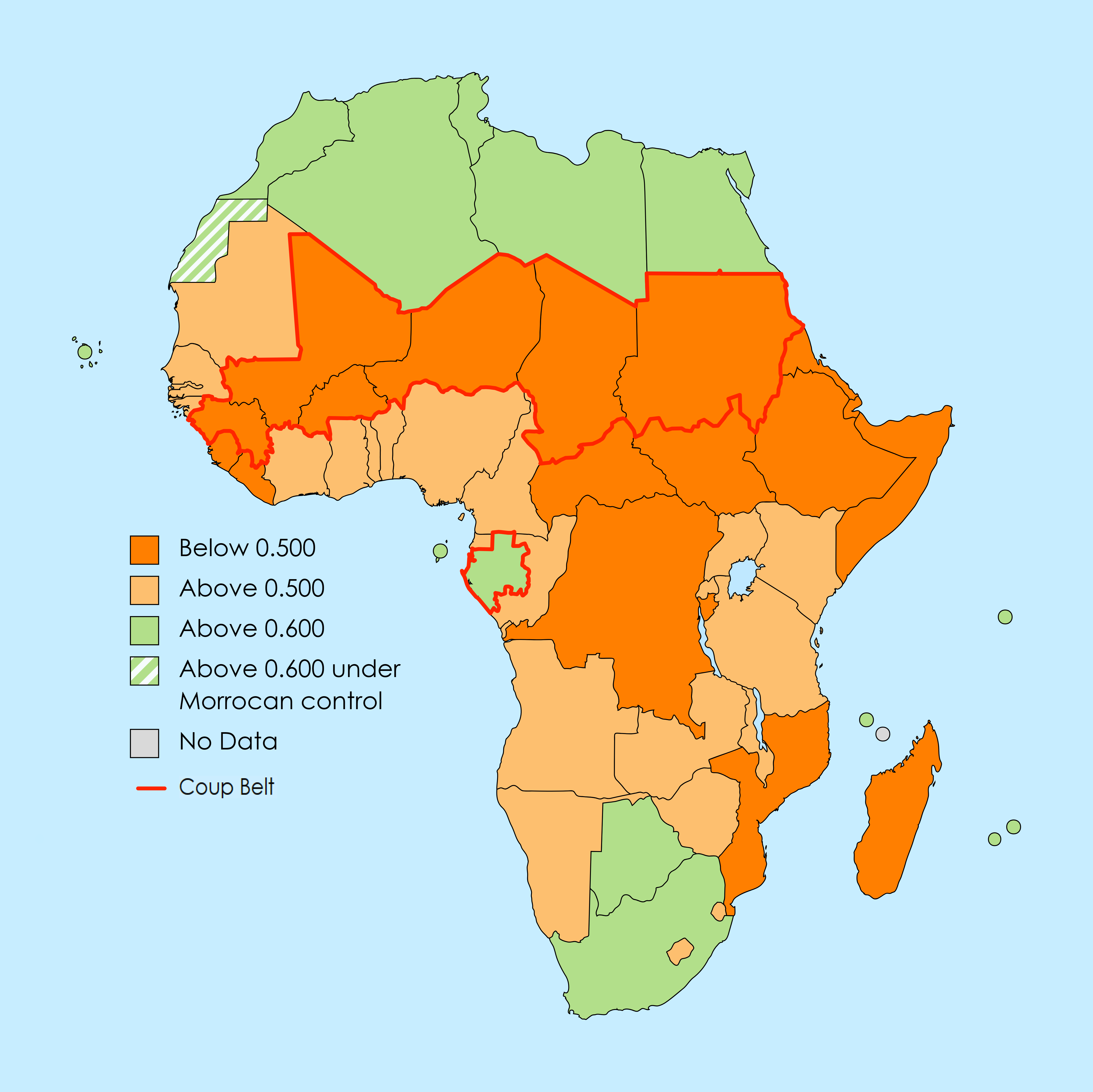
African countries’ Human Development Index with the Coup Belt outlined in red. Every country in the Coup Belt, except Gabon, has an HDI below 0.500. (Gabriel A. Álvarez N, Wikimedia Commons, CC BY-SA 4.0)
Western policy in the Sahel maelstrom seems to consist of salvaging anything they can from a possible unmitigated debacle — even as the stoic people in Niger are impervious to whatever narrative the west is trying to concoct.
It’s important to keep in mind that Niger’s main party, the “National Movement for the Defense of the Homeland” represented by General Abdourahamane Tchiani, has been supported by the Pentagon — complete with military training — from the beginning.
The Pentagon is deeply implanted in Africa and connected to 53 nations. The main U.S. concept since the early 2000s was always to militarize Africa and turn it into War on Terror fodder. As the Dick Cheney regime spun it in 2002: “Africa is a strategic priority in fighting terrorism.”
That’s the basis for the U.S. military command AFRICOM and countless “cooperative partnerships” set up in bilateral agreements. For all practical purposes, AFRICOM has been occupying large swathes of Africa since 2007.
How Sweet Is My Colonial Franc
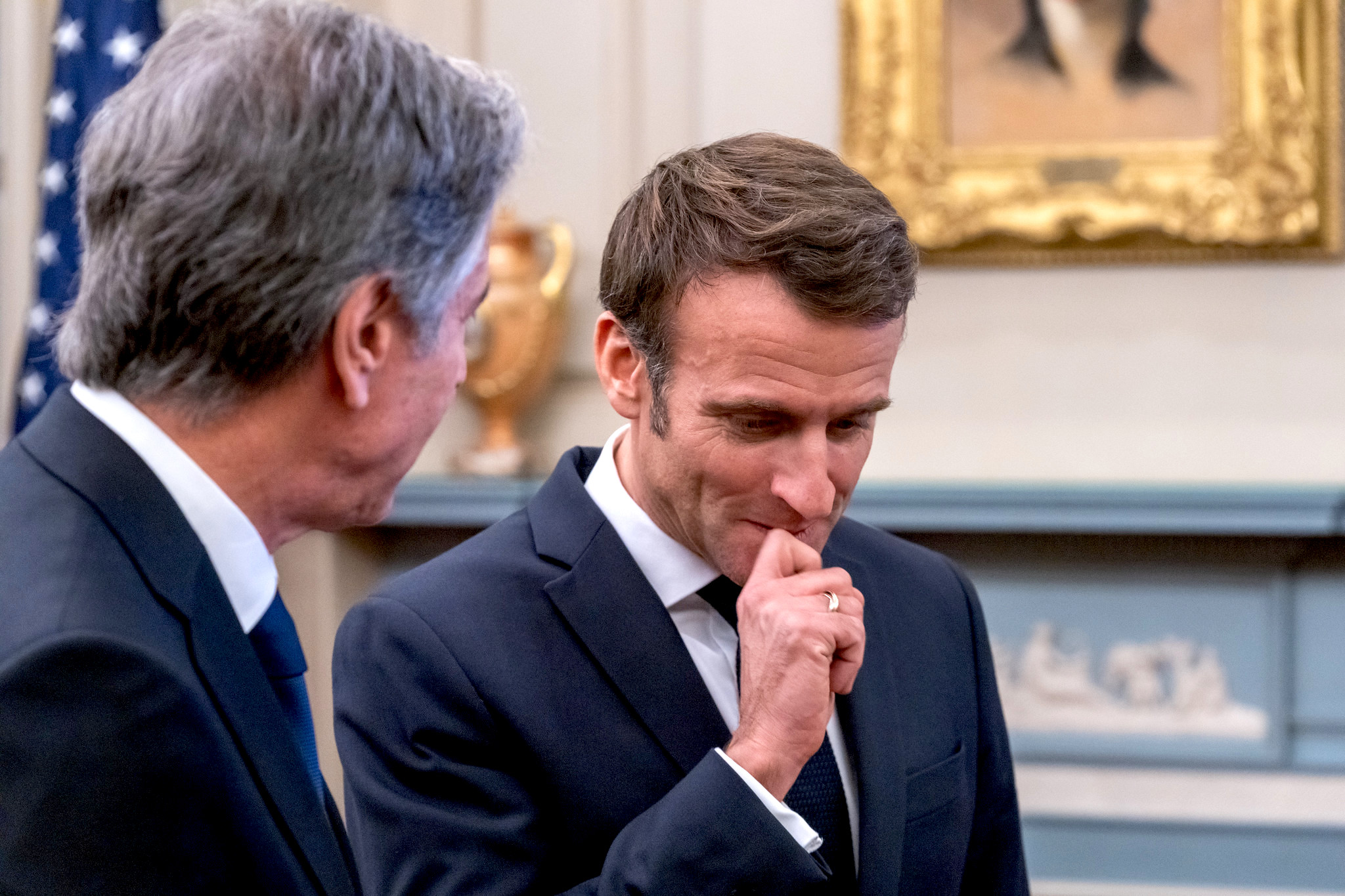
U.S. Secretary of State Antony Blinken with President Emmanuel Macron during the French leader’s state visit to Washington, Dec. 1, 2022. (State Department, Ron Przysucha, Public domain)
It is absolutely impossible for anyone across the Global South, Global Majority or “Global Globe” (copyright Lukashenko) to understand Africa’s current turmoil without understanding the nuts and bolts of French neocolonialism.
The key, of course, is the CFA franc, the “colonial franc” introduced in 1945 in French Africa, which still survives even after the CFA — with a nifty terminological twist — began to stand for “African Financial Community.”
The whole world remembers that after the 2008 global financial crisis, Libya’s Leader Muammar Gaddafi called for the establishment of a pan-African currency pegged to gold.
At the time, Libya had about 150 tons of gold, kept at home, and not in London, Paris or New York banks. With a little more gold, that pan-African currency would have its own independent financial center in Tripoli – and everything based on a sovereign gold reserve.
For scores of African nations, that was the definitive Plan B to bypass the Western financial system.
The whole world also remembers what happened in 2011. The first airstrike on Libya came from a French Mirage fighter jet. France’s bombing campaign started even before the end of emergency talks in Paris between Western leaders.
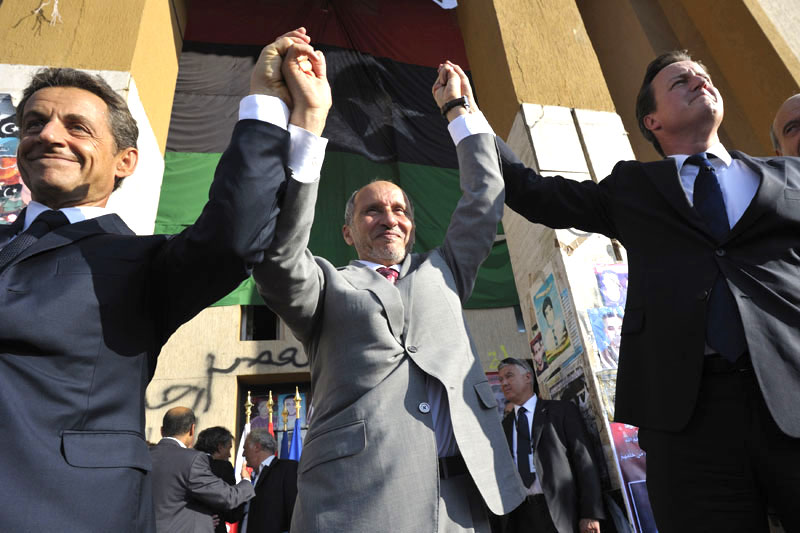
Sept. 15, 2011: From left: French President Nicholas Sarkozy, National Transition Council Chairman Mustafa Abdul Jalil and U.K. Prime Minister David Cameron in Benghazi, Libya, after they had all finished addressing a crowd in Liberty Square. (No. 10 Downing,CC BY-NC-ND 2.0))
In March 2011, France became the first country in the world to recognize the rebel National Transitional Council as the legitimate government of Libya. In 2015, the notoriously hacked emails of former U.S. Secretary of State Hillary Clinton revealed what France was up to in Libya: “The desire to achieve a greater share in Libyan oil production,” to increase French influence in North Africa, and to block Gaddafi’s plans to create a pan-African currency that would replace the CFA franc printed in France.
It is no wonder the collective West is terrified of Russia in Africa – and not just because of the changing of the guard in Chad, Mali, Burkina Faso, Niger and now Gabon: Moscow has never sought to rob or enslave Africa.
Russia treats Africans as sovereign people, does not engage in Forever Wars and does not drain Africa of resources while paying a pittance for them. Meanwhile, French intel and CIA “foreign policy” translate into corrupting African leaders to the core and snuffing out those that are incorruptible.
The Right to No Monetary Policy
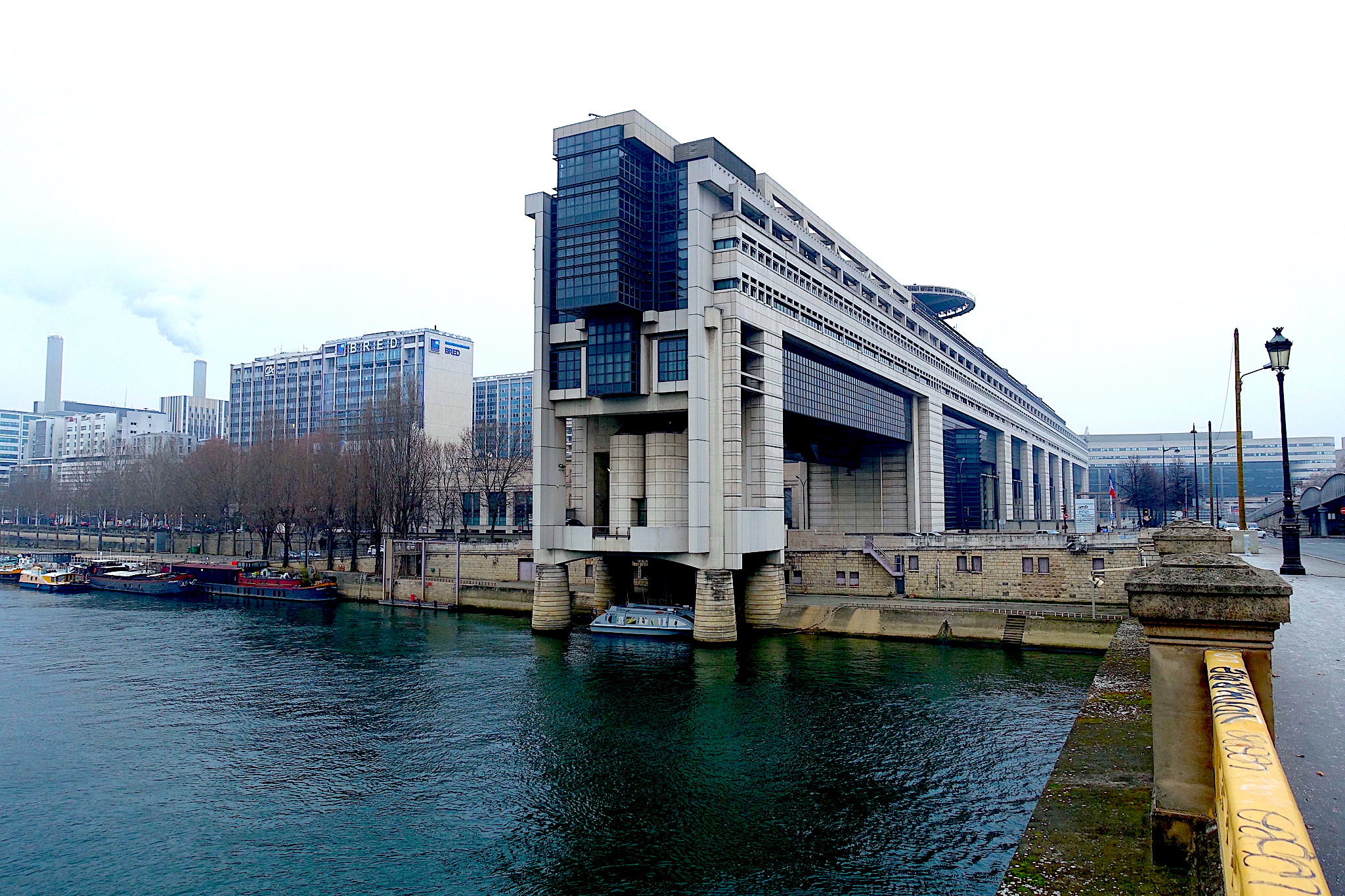
Seat of the French Ministry of Economics and Finance in the Bercy area of Paris. (Guilhem Vellut, Flickr, CC BY 2.0)
The CFA racket makes the Mafia look like street punks. It means essentially that the monetary policy of several sovereign African nations is controlled by the French Treasury in Paris.
The central bank of each African nation was initially required to keep at least 65 percent of their annual foreign exchange reserves in an “operation account” held at the French Treasury, plus another 20 percent to cover financial “liabilities.”
Even after some mild “reforms” were enacted since September 2005, these nations were still required to transfer 50 percent of their foreign exchange to Paris, plus 20 percent V.A.T.
And it gets worse. The CFA central banks impose a cap on credit to each member country. The French Treasury invests these African foreign reserves in its own name on the Paris bourse and pulls in massive profits on Africa’s dime.
The hard fact is that more than 80 percent of foreign reserves of African nations have been in “operation accounts” controlled by the French Treasury since 1961. In a nutshell, none of these states has sovereignty over their monetary policy.
But the theft doesn’t stop there: the French Treasury uses African reserves as if they were French capital, as collateral in pledging assets to French payments to the EU and the ECB.
Across the “FranceAfrique” spectrum, France still, today, controls the currency, foreign reserves, the comprador elites and trade business.
The examples are rife: French conglomerate Bolloré’s control of port and marine transport throughout West Africa; Bouygues/Vinci dominate construction and public works, water, and electricity distribution; Total has huge stakes in oil and gas. And then there’s France Telecom and big banking — Societe Generale, Credit Lyonnais, BNP-Paribas, AXA (insurance), and so forth.
France de facto controls the overwhelming majority of infrastructure in Francophone Africa. It is a virtual monopoly.
“FranceAfrique” is all about hardcore neocolonialism. Policies are issued by the president of the Republic of France and his “African cell.” They have nothing to do with Parliament, or any democratic process, since the times of Charles De Gaulle.
The “African cell” is a sort of General Command. They use the French military apparatus to install “friendly” comprador leaders and get rid of those that threaten the system. There’s no diplomacy involved. Currently, the cell reports exclusively to Le Petit Roi, Emmanuel Macron.
Caravans of Drugs, Diamonds & Gold
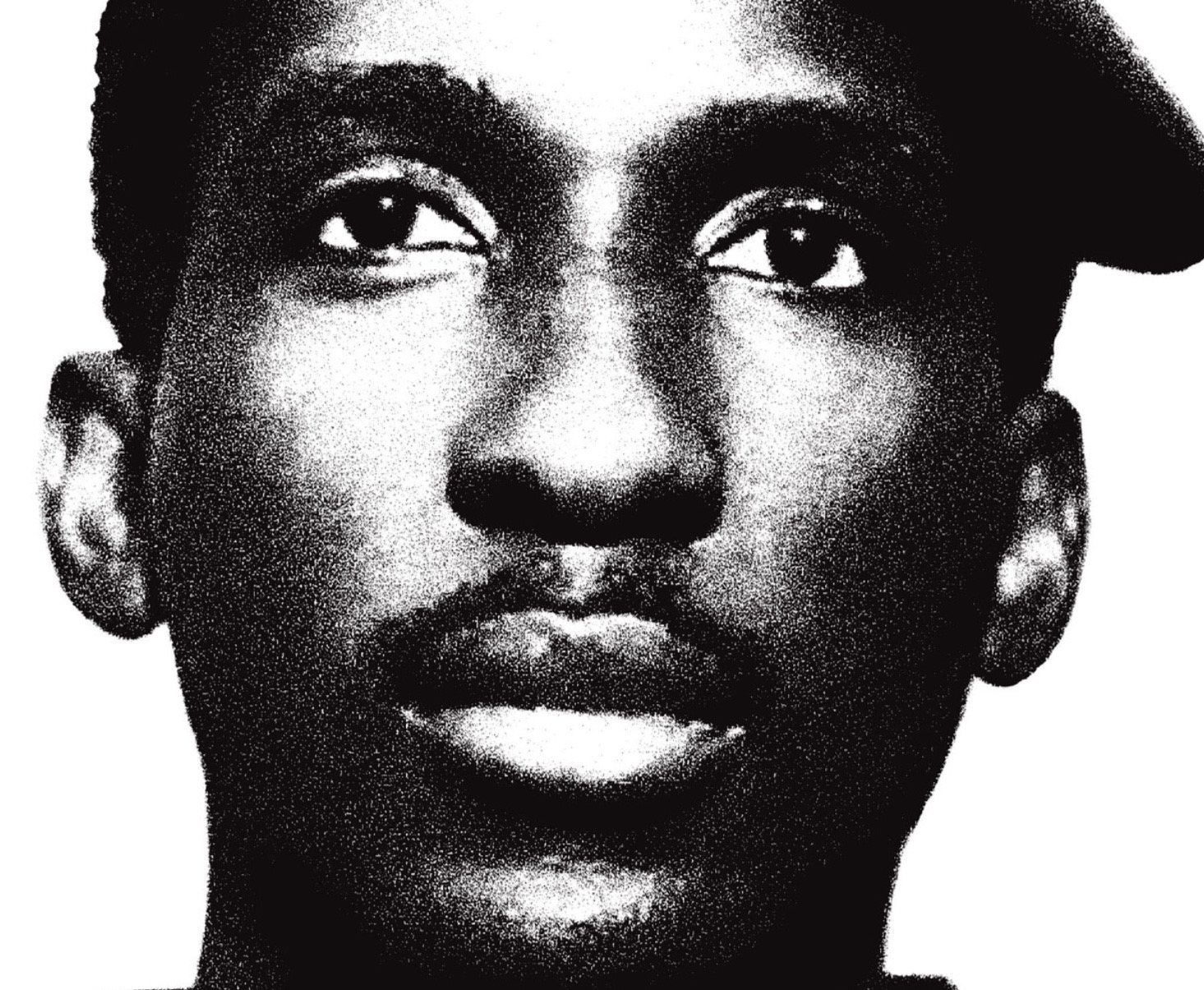
Portrait of Burkina Faso revolutionary Thomas Sankara. (CC0, Wikimedia Commons)
Paris completely supervised the assassination of Burkina Faso’s anti-colonial leader Thomas Sankara, in 1987. Sankara had risen to power via a popular coup in 1983, only to be overthrown and assassinated four years later.
As for the real “war on terror” in the African Sahel, it has nothing to do with the infantile fictions sold in the West. There are no Arab “terrorists” in the Sahel, as I saw when backpacking across West Africa a few months before 9/11. They are locals who converted to Salafism online, intent on setting up an Islamic State to better control smuggling routes across the Sahel.
Those fabled ancient salt caravans plying the Sahel from Mali to southern Europe and West Asia are now caravans of drugs, diamonds and gold. This is what funded Al-Qaeda in the Islamic Maghreb (AQIM), for instance, then supported by Wahhabi lunatics in Saudi Arabia and the Gulf.
After Libya was destroyed by NATO in early 2011, there was no more “protection,” so the Western-backed Salafi-jihadis who fought against Gaddafi offered the Sahel smugglers the same protection as before — plus a lot of weapons.
Assorted Mali tribes continue the merry smuggling of anything they fancy. AQIM still extracts illegal taxation. ISIS in Libya is deep into human and narcotics trafficking. And Boko Haram wallows in the cocaine and heroin market.
There is a degree of African cooperation to fight these outfits. There was something called the G5 Sahel, focused on security and development. But after Burkina Faso, Niger, Mali and Chad went the military route, only Mauritania remains. The new West Africa Junta Belt, of course, wants to destroy terror groups, but most of all, they want to fight FranceAfrique, and the fact that their national interests are always decided in Paris.
France has for decades made sure there’s very little intra-Africa trade. Landlocked nations badly need neighbors for transit. They mostly produce raw materials for export. There are virtually no decent storage facilities, feeble energy supply and terrible intra-African transportation infrastructure: that’s what Chinese Belt and Road Initiative (BRI) projects are bent on addressing in Africa.
In March 2018, 44 heads of state came up with the African Continental Free Trade Area (ACFTA) – the largest in the world in terms of population (1.3 billion people) and geography. In January 2022, they established the Pan-African Payment and Settlement System (PAPSS) – focused on payments for companies in Africa in local currencies.
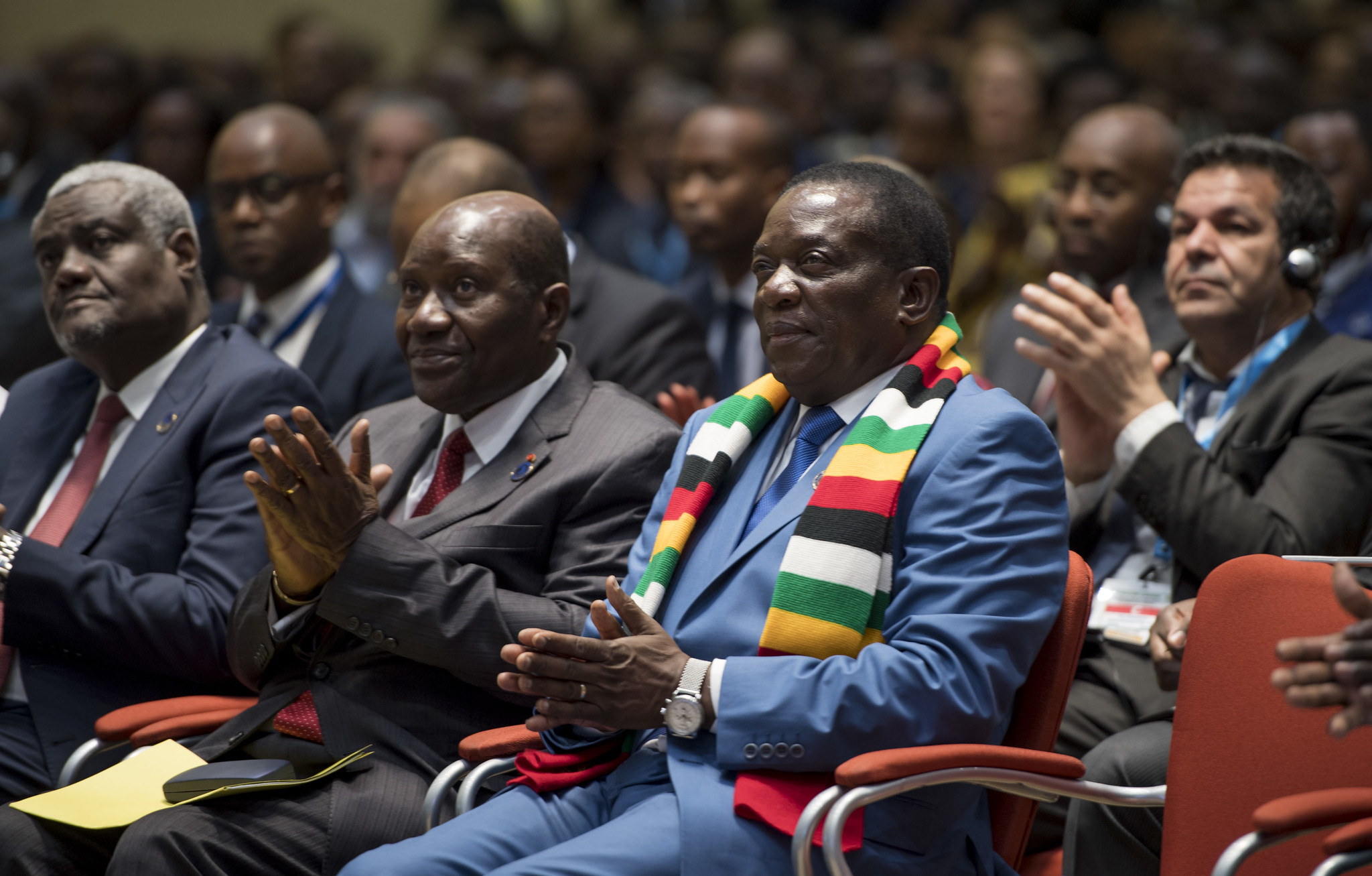
African Union Commission Chair Moussa Faki Mahamat, Ivory Coast Vice President Daniel Kablan Duncan and President Emerson Mnangagwa of Zimbabwe at the ACFTA business forum in Kigali, Rwanda, March 2018. (Paul Kagame, Flickr, CC BY-NC-ND 2.0)
So inevitably, they will be going for a common currency further on down the road. Guess what’s in their way: the Paris-imposed CFA.
A few cosmetic measures still guarantee direct control by the French Treasury on any possible new African currency set up, preference for French companies in bidding processes, monopolies, and the stationing of French troops. The coup in Niger represents a sort of “we’re not gonna take it anymore.”
All of the above illustrates what the indispensable economist Michael Hudson has been detailing in all his works: the power of the extractivist model. Hudson has shown how the bottom line is control of the world’s resources; that’s what defines a global power, and in the case of France, a global mid-ranking power.
France has shown how easy it is to control resources via control of monetary policy and setting up monopolies in these resource-rich nations to extract and export, using virtual slave labor with zero environmental or health regulations.
It’s also essential for exploitative neocolonialism to keep those resource-rich nations from using their own resources to grow their own economies. But now the African dominoes are finally saying, “The game is over.” Is true decolonization finally on the horizon?
Pepe Escobar is a columnist at The Cradle, editor-at-large at Asia Times and an independent geopolitical analyst focused on Eurasia. Since the mid-1980s he has lived and worked as a foreign correspondent in London, Paris, Milan, Los Angeles, Singapore and Bangkok. His latest book is Raging Twenties.
The views expressed are solely those of the author and may or may not reflect those of Consortium News.
Donate to CN’s
Fall Fund Drive



I always look forward to a Pepe Escobar piece.
Its comprehensive, detailed and insightful.
Regarding this piece i wonder what Yves Godard would say about today?
In 1991, as the Cold War ended, America got started on World War III. In Africa. They supported the Tigrayans in their takeover of Ethiopia and the Tutsis in their invasion of Rwanda. Although UN Secretary-General Boutros Boutros-Ghali called the latter a 100 percent American operation they did get help from the Belgians and British. But not the French. For whatever reason the French were totally excluded. When the Americans wanted a French speaker of their own on the ground (they didn’t trust the Belgians) they got Canadian Romeo Dallaire. The French quit Rwanda in 1993 but they still got more blame for the massacre than the Americans.
France and America were the major players in the destruction of Libya but whether they patched up their differences or it was just a confluence of interests is unclear. Eight coups in three years with many of the plotters trained in America sounds like more than a coincidence. I wouldn’t count on American-French solidarity
Probably the best outcome is America gets France booted out of west Africa without achieving their own objectives (whatever those might be) and France quits NATO in a huff, initiating a stampede for the exits.
Thanks for this reporting. I was not fully aware of how deeply neoliberal colonialism continues to assault Africa. The actions across the Sahel make more sense now. Is anyone aware of an up-to date article or book that examines how the US has (continues to) manipulated central and south American nations and their economies? My sense is that so much of the southern border issues are sequelae to the US’s intervention in our neighbor’s affairs.
ok, now it makes more sense, thank you. Decoupling is not the same as derisking. I strongly believe that Europe has gone “Out of the frying pan into the fire”, by decoupling from Russia EU has increased exponentially its risks. Nord Africa is way more risky than Russia, way more unstable. What were they thinking?
Ideology literally fries the brain; but the problem I see is a serious one, in our culture holistic intelligence, system thinking intelligence are underdeveloped, we favored reductionism, which for simple problems/systems works very well, but when the problems/systems increase in complexity it is just not the right tool.
We have our limits, and the lack of such intelligence is a huge one; while, chinese culture is more oriented toward an holistic approach.
AI won’t save us because it is created by us, it has the same DNA.
The solution for EU is a hard one but it will save it and make it better, let US go and move east. But time is ticking, and the window is closing; as long as neo conservatives/ neocolonialist like Borrell and Von Den Layen dominate the scence Europe is doomed.
It is about time this travesty of neocolonial injustice is ended. May Africa rise and keep on rising.
Themes on which African Americans ought to focus and then, discard their Democratic Party overseers. Amazing that the African people still have the energy and will to fight to end their economic enslavement by France, and, of course, French friends who will remain unnamed.
Africa is awakening. And the rest of the world better notice if it wants to continue to rule, which it won’t as African change (pun intended) and economic independence expands.
Africa is awakening???
According to the UN there are 54 ‘independent’ states on the entire African continent, while that continent is 74% larger in land mass than the entire continental US., with a mere 50 non cooperative federated states.
When is the dissension among the US populace going to disappear such that its tribal communities too will awaken to their own rulers greed and hegemonic ‘exceptionalist’ bigotry??????